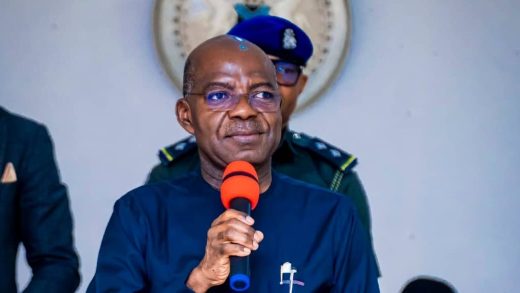A Clash Beyond Concrete
The past week has been unusually dramatic in Nigeria’s political scene. What began as a technical question about the cost per kilometre of the Lagos–Calabar Coastal Highway has spiraled into a fiery public scuffle between Governor Seyi Makinde of Oyo State and Minister of Works, David Umahi.
But beneath the noise lies something deeper — a contest between ego and expertise, transparency and technicality, governance and grandstanding.

The Scene That Started It All
During a recent Arise TV interview, Minister Umahi was asked a seemingly straightforward question:
“What’s the cost per kilometre of the Lagos–Calabar Coastal Highway?”
Instead of providing a clear figure, Umahi explained that costs vary based on terrain, design, and other technical details — refusing to give a single number.
That didn’t sit well with Governor Makinde. The engineer-turned-politician accused Umahi of “dancing around the truth” and hiding behind technical jargon. According to Makinde, road projects, no matter how complex, can still have average cost estimates for transparency’s sake.
The Minister Strikes Back
Umahi didn’t take kindly to that criticism.
During an inspection tour, the Works Minister — himself a civil engineer and former governor — fired back with what many saw as condescending confidence. He reminded Makinde that he was not only his senior in governance, but also in engineering.
He went further, bragging:
“I am an ‘A’ student in Mathematics. Makinde is my junior. Electrical electronics no reach civil engineering!”
He challenged Makinde to a public debate on road construction costs, insisting that his critics don’t understand how infrastructure pricing actually works — and that it’s too early to release cost-per-kilometre figures when the project is ongoing.
More Than a Road: A Mirror of Our System
As entertaining as this spat may be, it raises some hard questions about governance culture in Nigeria.
1. Transparency vs Technical Defence
Makinde’s argument speaks to the public’s frustration: when billions are being spent, Nigerians deserve clarity. Umahi’s defence — that costs depend on countless factors — might be technically correct, but it also feels like a convenient escape route from accountability.
2. Professional Pride and Political Ego
Both men are engineers, and both are proud of it. But somewhere between “I’m an A student” and “You’re being evasive,” Nigeria’s leadership debate got reduced to a battle of egos, not ethics.
We’ve seen this before — technical experts using complexity as a weapon against public questioning. Umahi’s tone suggests that ordinary citizens (and even fellow governors) shouldn’t ask too many questions about “engineering things.” That’s a dangerous attitude.
3. The Optics of Power
For Makinde, this was a chance to score moral points — standing on the side of accountability. For Umahi, it was about asserting authority and competence. Both know they’re being watched by millions, and each wants to look like the adult in the room. The real loser? The Nigerian public still left guessing how much the highway actually costs.
Why This Matters
Infrastructure isn’t just about asphalt and concrete — it’s about trust. When officials treat cost breakdowns like state secrets, it weakens public confidence and fuels suspicion of inflated contracts.
If the Lagos–Calabar Coastal Highway truly represents progress, then transparency should be its foundation. Nigerians shouldn’t have to decode political banter to know where their money is going.
Final Thoughts
Let’s be honest — Makinde and Umahi both made valid points. Projects of that scale do have variable costs. But a ballpark figure shouldn’t be too much to ask. Hiding behind “engineering complexities” only feeds public cynicism.
And when ministers start talking about who’s the “senior engineer,” it’s clear the conversation has shifted from public interest to personal pride. Nigeria deserves leaders who argue with data, not with titles.
In the end, this wasn’t just a quarrel between two politicians — it was a public reminder of how ego often overshadows accountability in our governance space. Until we fix that, our roads — and our politics — will keep going in circles.


